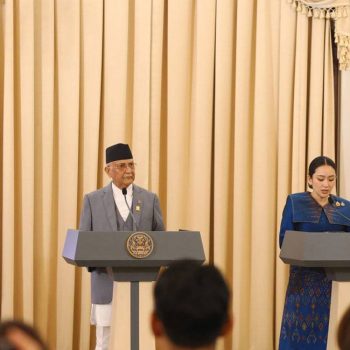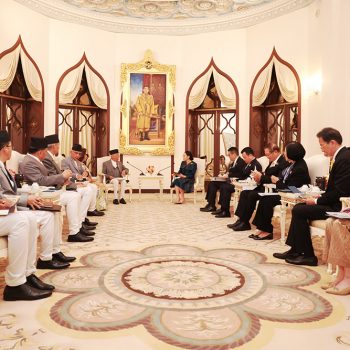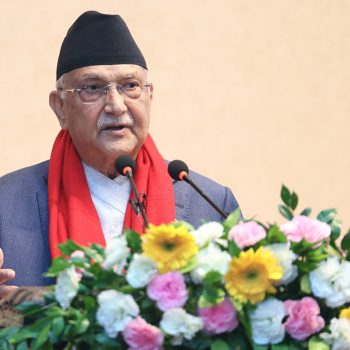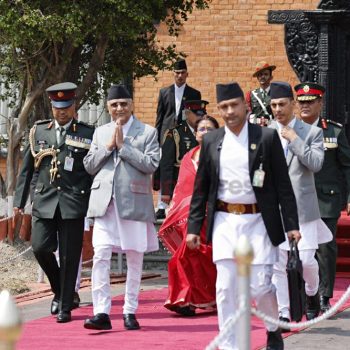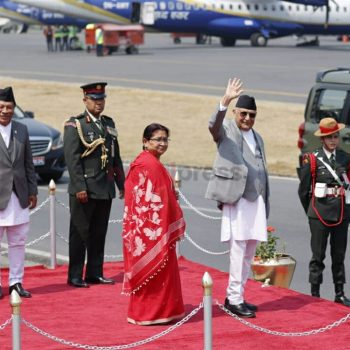Interview with Lingcheng Wu, Director of ORO Nepal
 NepalPress
NepalPress

KATHMANDU: The South and Southeast Asia Commodity Expo and Investment Fair (SSACEIF) 2021 is going to be held in Yunnan Province of China at the end of August. The Overseas Representative Office of Yunnan Commerce (ORO) has been facilitating the participation of companies and enterprises from Nepal.
To find out more about the event and Nepal-China trade, Nepal Press recently caught up with Lingcheng Wu, Director at ORO Nepal and Bhutan Office this week.
Excerpts:
Please introduce your organization ORO Nepal. What are its major services in Nepal?
The full name of ORO Nepal is Yunnan Commercial Overseas Representative Office, Nepal(Kathmandu) Branch. As a representative of the Yunnan Provincial Government, we’re majorly focusing on improving Government-to-Government( G2G) relationship as well as initiating Business-to-Business( B2B) cooperation between Nepal and China.
Since its establishment in 2015, ORO Nepal has held multiple events for trading and tourism-related business, such as the China-South Asia Expo in 2017, Yunnan Organic Products Exhibition in 2018, ‘Visit Nepal 2020’ Tourism Promotion Fair in 2019. Moreover, we’ve linked enterprises to cooperate in the sectors of energy, hospitality, flower, agriculture and more.
Since its inception, ORO Nepal Office has been closely working with the Nepalese government departments to provide a consultative service for the commercial “leading-into and going-out” between Yunnan and Nepal. We also provide guidance services for Yunnan enterprises to develop in Nepal and Nepal enterprises to enter Yunnan. ORO Nepal office is to and will play an important role in promoting bilateral win-win cooperation between Yunnan and Nepal.
Since Yunnan is hosting the 2021 South and Southeast Asia Commodity Expo and Investment Fair, what is it all about? How can the Nepali business community participate?
China-South Asia Expo(CSA Expo) / South and Southeast Asia Commodity Expo and Investment Fair (SSACEIF) both are hosted by Yunnan. The difference is CSA Expo is held in the even years, which is a national-level event that majorly focuses on improving China and South Asia countries’ G2G relationship as well as B2B cooperation, while SSACEIF is a provincial level organized event held in the odd years.
Last December, due to the Covid-19 pandemic, CSA Expo was held online, however, it successfully invited more than 10,000 exhibitors and buyers.
This year, SSACEIF will have a more convenient operation mode for exhibitors. Nepali companies can register online by themselves through the website www.csa-expo.com after which ORO will review the company’s profile and recommend the company to different booths. The participating companies will have their own web page, where their products, project briefs, and all cooperation intentions can be shared using provided templates.
ALSO READ: SSACEIF 2021 call Nepali enterprises to grab an opportunity
In your opinion, what are the major prospects in trade and business between Yunnan Province and Nepal? Which sectors hold more significance?
Trading and business between Nepal and Yunnan have a long history, it can be traced all the way back to the Tea-horse Ancient Road. Now, with the easy connection of weekly airlines and road access, we can do much more. Yunnan Province has an initiative of “Green Food, Green Energy, Healthy Life Destination”, which I think has striking similarities with Nepal. And for that, we could join hands together to work on an agro-tech exchange, botanic variety exchange, infrastructure/power-related construction cooperation and tourism cooperation among others.
Also for trading, Yunnan has a remarkably large production of tea, herbal medicines, fruits, vegetables, coffee beans, flowers, which can meet Nepal’s needs if needed or requested. From the Nepal side, we can consider exporting pollution-free farm products, higher value-added products, and those unique products, like Ilam tea, Pashmina, Himalayan herbal medicine, Himalayan black and rose salt, handicrafts, etc.
Since you have stayed in Nepal for a couple of years, how do you see the business and investment environment in Nepal? Is it satisfactory?
Overall the business and investment environment is not too bad in Nepal. There are many sectors where Chinese investors can invest easily, without safety or other threats. However, I am aware of frequent government changes in Nepal. From my point of view, even if there is a political mess, it’s good to know that the ruling party respects the paper works, and doesn’t break any contract or promise.
However, there are some difficulties for projects like land acquisition, mandatory foreign currency exchange, the unreasonable capital requirement for company registration, unclear preferential policies, among others. The bureaucratic hassle is time-consuming and energy-draining. Sometimes, it becomes complicated to complete the work timely. Also, since there is a possibility of a communication gap, I find there is a lack of accurate and enough Chinese-Nepali interpreters in the business sector.
How can Nepal attract more investors from China, Yunnan Province in particular?
Actually, I reckon Nepal is doing well in attracting foreign investors. If there wasn’t this irresistible factor of COVID, with the access of roads, power supply, as well as easy taxation and legal affair policies, there are many sectors where investors can be attracted.
The establishment of the representative offices, as one in Nepal, has built overseas operating bases and platforms for Yunnan’s opening to the outside world. We are here to help in promoting the development of foreign trade to achieve leaping development in depth.
Having stayed in Nepal for a couple of years, I see that there is a huge potential for investment from the Chinese side. However, I would like to pass one suggestion to the ministries and all the concerned authorities, “Please make your English website valid and synchronize it to the Nepali one, which could make a lot of work easier.”
What are the major challenges of doing business in Nepal for the Chinese business community?
The first thing is banking and finance services. Most of the Chinese people have to face the problem of transferring money from China to Nepal, and vice versa. Company staff in Nepal, either themselves or their company, need to pay high tax for salary, which is understandable. But when they want to transfer money to China, they are forced to endure the exchange rate loss, high handling fee and another tax payment.
The second thing is the work permit, business visa application regulations. Take ORO as an example, we registered this office in 2015 and we can’t apply for work permit or business visa under our office name because it’s classified as a liaison office. And we had to register a company just for our visas which is very inconvenient and creates a huge amount of unnecessary expenses. These are small details but can be challenging for Chinese business offices and representatives. The process should be simple, and easier rather than complicated. Thus, I suggest the authorities to make clear, reasonable, and consistent policies for foreign investors.
Since India is the major trading partner of Nepal, how can Nepal explore and take benefits from the Chinese market?
Regarding trade between India and Nepal, there is an open land border and has the advantage of logistics that make the products price much cheaper. But with the roads being constructed towards the north and possible railways from China in future, there might be more opportunities for Nepal to enter into the Chinese market. Currently, Nepali local industries mostly depend on imports, be it ready-made products or raw materials. They need to develop joint ventures with Chinese companies to start domestic production, then after a few years own the tech and advance the tech.
Take the recent hot topic of coffee for example. Growing and selling beans could be simple and less beneficial, but on the processing chain, there can be more value-added business. Local companies can also focus on baking, grinding, extracting, etc. They can have tie-ups with Chinese companies for processing machinery, branding, packaging and so on. It’s just an example. There could be many such.
China is rich in advanced technology, so the Nepali government and private companies should look forward to work with China to yield greater benefits. With connectivity getting stronger, there are huge prospects from the Chinese market.








